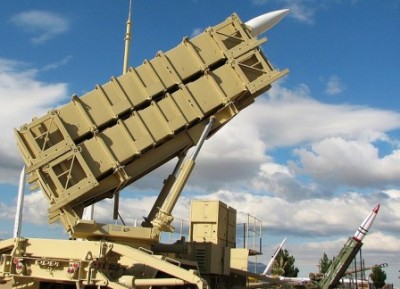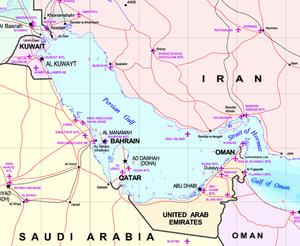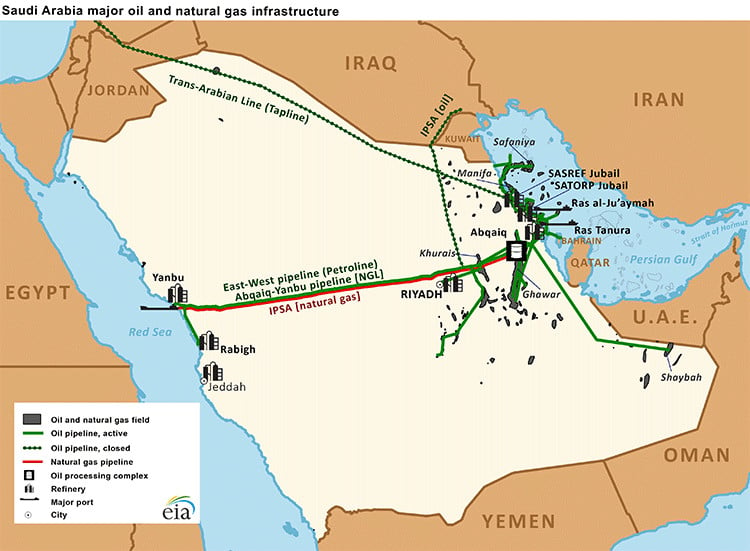The Attack on Saudi Arabia’s Oil Facility. The Patriot Air Defence System Failed. Why?

On Saturday September 14 2019, a missile and drone attack was waged against the world’s largest oil processing facility in Saudi Arabia.
Yemen’s Houthi forces from the Ansar Allah movement claimed responsibility for the attack.
Washington blamed Iran. In chorus, the media pointed to the Houthis supported by Iran or attacks waged directly by Iran.
The media consensus: the attacks were ‘unquestionably sponsored by Iran’.
There are many unanswered questions, the most important of which is:
Why did Saudi Arabia’s advanced Patriot Air defense system fail to detect the drones and missiles?
According to the Wall Street Street Journal:
U.S. and Saudi officials didn’t anticipate a strike from inside Iran, officials said, rather than through one of its proxy forces or elite military units.Saudi and U.S. focus had been largely on the kingdom’s southern border with Yemen, where Riyadh has been fighting Iranian-backed Houthi rebels in Yemen’s civil war, the officials said. The attacks, however, originated from Iranian territory in the northern Persian Gulf, ……The absence of air-defense coverage left Saudi’s eastern flank largely undefended by any U.S. or Saudi air-defense systems, … The glaring blind spot also left Saudi Arabia exposed to a threat despite spending billions annually on its defense budget.“You know, we don’t have an unblinking eye over the entire Middle East at all times,” Marine Gen. Joe Dunford, chairman of the Joint Chiefs of Staff, told reporters near London on Tuesday. (emphasis added)
These are nonsensical statements.
The whole Persian Gulf defense apparatus which includes strategic US and allied military facilities is based on “anticipating” strikes from Iran. Saudi Arabia’s Air defense is coordinated by the Royal Saudi Air Defense Forces (RSADF) which constitutes a separate branch of the Armed Forces.
The Eastern flank of Saudi Arabia is “not undefended”. Quite the opposite: it is protected by the US multibillion dollar Patriot Air Defense system. Western defense analysts know this inside out.
Moreover, that Eastern flank of Saudi Arabia is heavily militarized. It includes several important US and allied military facilities in Saudi Arabia (as well as in the UAE, Bahrain, Kuwait, Qatar and Oman)
According to reports, US and Saudi officials were taken by surprise. Again a nonsensical statement.
They did not expect that the attack would come from the North. According to the Saudi Defence ministry spokesman Colonel Turki Al-Maliki,
“The attack was launched from the north and unquestionably sponsored by Iran, … We are working to know the exact launch point. … This is the kind of weapon the Iranian regime and the Iranian IRGC are using against the civilian … facilities”
Why did the air defense system fail? The underlying statements intimate that the air defense umbrella so to speak was geared towards defending Saudi Arabia solely from attacks coming from the South. A totally absurd proposition.
At the same time Coronel Al Maliki at the press conference contradicts this interpretation, stating that the Houthis did not have the capabilities of attacking them from the South beyond 700 km.
Listen carefully to the Aramco press conference: Colonel Turki al-Maliki. (17’00) (Al Arabya, published September 18, 2019)
When questioned on why the air defense system failed, Colonel Al Maliki stumbled. (17′.30″),
“Mark Stone from Sky News. With respect, this is quite an embarrassing display for the Saudi military because it’s quite clear that your air defenses failed incredibly badly that so many missiles and drones were able to penetrate deep into Saudi Arabia”
He did not answer the question. He pointed to the very large number of ballistic missiles and UAVs which had previously been intercepted (since 2015). But no mention on the number of missiles and UAVs intercepted on September 14:
“We are pretty proud about our air defense. Our air defense has intercepted until now almost 232 ballistic missiles [no details provided]. There is no country in the world [which has] been attacked with such [a large] amount of ballistic missiles and no attack to any country with 258 UAV. Our air defenses with the ability we have and our officers, NCOs and the community we have as air defense to locate as a tactical disposition on the ground. We save our nation. We save our country. If you think they are (INAUDIBLE), we are very proud of our defense. I’m sure the Saudi nation, they are pretty proud about our air defense.” (emphasis added)
Failure of the Air Defense System? Or Was the Patriot System “Disabled” on September 14?
Why did it fail?
There is of course the fashionable thesis that the US Patriot System is flawed in comparison to Russia’s state of the art S-400 air defence system. This assessment is correct but is it relevant?
Other reports point to the fact that the cruise missiles and UAVs were flying at low altitude (and could not be detected by the radar system).
“These were low-flying cruise missiles. They were coming in far below the engagement zone for Patriot. So you wouldn’t have tried to hit them with Patriot.” (CNBC)
But this does not explain the total failure of Saudi Arabia’s air defence system on that particular day. The Patriot system (PAC) is extremely versatile and advanced. The apologetic reports on the failure of the Patriot Missile system in intercepting low-flying missiles are contradictory (focusing allegedly on weak radar capabilities at low altitude).
The US-made Patriot mobile air defense system produced by Raytheon is specifically “designed to intercept tactical ballistic missiles, low-flying cruise missiles and aircraft.” (I24news.tv, May 10, 2019). It uses an advanced aerial interceptor missile and high-performance radar systems.
The attack on Saturday September 7, was made up of a total of 18 drones (UAVs) and seven missiles.
Strategic targets had been carefully selected. An early report on the 14th of September suggested that the Patriot air defense system could have been “disabled by the rebels” (as occurred in previous attacks):
“the rebels have flown drones into the radar arrays of Saudi Arabia’s Patriot missile batteries, according to Conflict Armament Research, disabling them and allowing the Houthis to fire ballistic missiles into the kingdom unchallenged.” (CNBC, September 14, 2019, emphasis added)
This report intimates that the Patriot Air System might have been inoperative on September 14, which suggests that drones or missiles were not detected or intercepted.
The data on the interception of missiles and UAVs in previous attacks against Saudi Arabia is routinely reported. No “official” data, however, was released with regards to the September 14 attacks. Nor was the issue mentioned in the press conference.
Whereas the Wall Street Journal acknowledges the failures of the Patriot System while blatantly “inflating” the number of missiles and UAVs launched, the data on how many were intercepted is simply not mentioned:
U.S. and Saudi military forces and their elaborate air-defense systems failed to detect the launch of airstrikes aimed at Saudi Arabian oil facilities, allowing dozens of drones and missiles to hit their targets, U.S. officials said.
How many were intercepted? Defense specialists are mum on the subject and official statements have carefully avoided discussing it. Visibly that information is being withheld.
That leads us to the smoking gun question.
Was the Patriot Air Defense functional on September 14? This matter has to be investigated.
Was it the rebels who disabled the Patriot system (as mentioned in the CNBC report) or was it something else. Was there an explicit order emanating from US and/or Saudi officials not to activate the air defense system on that day?
18 drones and 7 missiles were launched. Major strategic targets –which had been carefully selected– were reached without impediment.
In other words, while it may be premature at this stage, we should not exclude the possibility that this was a False Flag with major repercussions on energy and financial markets.
The financial reaction was immediate. Saudi stocks fell, the oil prices rose, then settled and later fell again. It was an immediate reaction of major banks’ algorithmic speculation with about 10,000 operational hits a second. A trial for larger things to come? (Peter Koenig, Global Research, September 21, 2019)
Colonel Turki Al Maliki’s Press Conference
Aired September 18, 2019 – 11:00 ET
RUSH TRANSCRIPT (source CNN)
[11:00:00]
UNIDENTIFIED MALE: So is it Iran?
COL. TURKI AL-MALIKI, SAUDI DEFENSE MINISTRY SPOKESPERSON: Thank you.
UNIDENTIFIED MALE: So is it Iran?
AL-MALIKI: Thank you.
UNIDENTIFIED MALE: Is it Iran?
AL-MALIKI: Thank you. Will you please. I am controlling the press conference. Have a seat please.
MARK STONE, SKY NEWS: Thank you very much, Mark Stone from Sky News. With respect, this is quite an embarrassing display for the Saudi military because it’s quite clear that your air defenses failed incredibly badly that so many missiles and drones were able to penetrate deep into Saudi Arabia. First of all, why did your air defenses fail? And secondly, what will the response of Saudi Arabia by to quite such a substantial attack?
AL-MALIKI: Thank you. We are pretty proud about our air defense. Our air defense has intercepted until now almost 232 ballistic missiles. There is no country in the world been attacked with such amount of ballistic missile and no attack to any country with 258 UAV. Our air defenses with the ability we have and our officers, NCOs and the community we have as air defense to locate as a tactical disposition on the ground. We save our nation. We save our country. If you think they are (INAUDIBLE), we are very proud of our defense. I’m sure the Saudi nation, they are pretty proud about our air defense.
The other question. Right now, we are working as I mentioned to determine the exact position of the launch point. Either that it launched from Yemen, launched from somewhere else. Those people, they will be accountable and this is the decision of the political level in our country and we are just a military tool. That’s for the — I cannot say exactly what’s the decision would be taken and that level for a spokesman for the ministry of defense.
STONE: But just to clarify, you did say that they definitely were not launched from Yemen, correct?
AL-MALIKI: Yes, thank you.
UNIDENTIFIED MALE: (INAUDIBLE) from NRV TV. Colonel al-Maliki, I mean, it’s obviously that the world is suffering from terrorism all around, whether it’s from wish of countries and governments. And you’ve asked for the international community to acknowledge and take action towards these militias and the government which are attacking and provoking the area and all the world. What actions are you looking for? What actions are you hoping for?
AL-MALIKI: Thank you so much. I do agree with you. We know the terrorist act, as your friend here, he asked before, the terror act just needed tools. When terrorist act or terrorist group, they have conducted an attack in Europe, U.K., Spain, South Asia, United States, Saudi Arabia, it doesn’t mean there is a system had been failed. But those mind of ideology, they’re trying to go from the system and to do such terrorist attack to the civilians and they don’t believe in (INAUDIBLE).
The threat that we are facing, all of us, as I mentioned in the beginning, not just for the kingdom of Saudi Arabia. The Iranian regime, the lion activity has been around in (INAUDIBLE) and also the Africa and they are working to support the terrorist group around the world. One of the things that we’re working — will not allow such capability and we have seen the Iranian regime or the IRGC, have given such capability to the Houthi and they are using it against the civilian people and the Saudi or the GCC.
I think it’s their responsibility for the whole international community to stop Iran from the blind activity to put accountability on them from the United Nations, the Security Council and that threat that’s not just for Saudi but are attacking Saudi Arabia today. They are supporting other terrorists’ groups in Lebanon, in Syria, in Yemen and around the world. So it’s their responsibility for the whole international community. Thank you.
The last two questions, please.
UNIDENTIFIED FEMALE: Sir (INAUDIBLE).
AL-MALIKI: Would you please move close to the mic.
UNIDENTIFIED FEMALE: Sir, could I ask. You say you’re trying to pinpoint exactly where these missiles were fired from. Do you believe in the end you will find that they came from Iran itself and from Iranian soil?
AL-MALIKI: I believe that we will spot the launch point of this terrorist attack.
UNIDENTIFIED FEMALE: Do you think that’s most likely going to be Iran?
AL-MALIKI: I am sure we’ll spot it.
[11:05:00]
And we are working and whoever is responsible about it, they will take that accountability.
UNIDENTIFIED FEMALE: In a military way?
AL-MALIKI: Next question.
IAN LEE, CBS NEWS: Ian Lee from CBS news. My question for you is Secretary of State Pompeo is going to be visiting today. What do you want to see from the Americans? What concrete steps would you like to see the Americans take to prevent something like this from happening again? The other question is we’ve seen — as you’ve shown, there’s been what looks like hundreds of attacks, many attacks, yet Saudi hasn’t responded militarily to Iran. When is the breaking point? What is the red line for you where you feel like you’ll be compelled to respond militarily?
AL-MALIKI: Thank you very much. Yes, of course, we do have a strong relationship with the United States in terms of military relationship that we’re working together to face the threat that we — it’s not just for the Saudi and for the international community. We’re working together to preserve the peace and stability in the region and to also secure our national security.
What we need, we are working together to share the information. In Saudi Arabia there are more than 54,000 American people that are living with us. Of course, we are sharing such information with the Americans first. As I mentioned, this kind of information to save our people and the people that are living here in Saudi Arabia and to know exactly the OTTB of the tactic procedure for the Iranian regime how they’re using such weapons in a terrorist attack.
It comes to the other question, it’s not — we are working right now to know the launch point. I think I mentioned it for you and for your friends. That we are working to know exactly the launch point. And when we have it, we will have the evidence. And the decision is not at my level.
LEE: If this is coming from Iran, though, that you say all this is Iranian backed, if it’s not directly coming from Iran, it’s Iranian backed. Do you see this as — do you see there being a need to go after Iran if Iran is going after you?
AL-MALIKI: I think they are now — they figure out they have discovered that we have a common understanding about the threat that’s coming from the IOGC. It’s our responsibility all of us to stop that Iran activity. And we are working together in that aspect. The decision I think not just for the GCC country, but also for the allies because they are threatening them many time, and we know the act lately it’s been conducted in the region.
Thank you.
I would like to thank you your excellencies, ladies and gentlemen for attending this brief. We are still working on the information as I mentioned to determine exactly the launch point. And when we find the final launch point, that they are attacking Saudi Arabia. We will announce this through a press conference. Thank you again.
The original source of this article is Global Research
Copyright © Prof Michel Chossudovsky, Global Research, 2019







Geen opmerkingen:
Een reactie posten